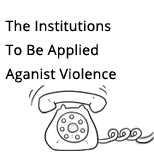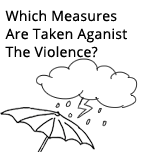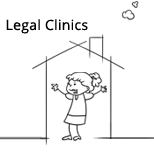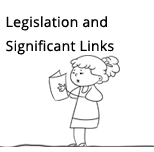How can I do?
INFORMATION IS THE FIRST STEP FOR ACCESS TO JUSTICE
I AWARE OF VIOLENCE AND I AM NOT DESPERATE!
What is violence?
Cycle of violence
Who is the victim of violence and how is the victim protected?
The places to be applied
Protection from violence and violence prevention
TO PROTECT FROM VIOLENCE AND PREVENT VIOLENCE is possible by information!
THE MAIN CAUTIONARY DECISIONS TAKEN FOR THE BENEFIT OF THE VICTIM
Moving the perpetrator of violence from the house,
Providing a shelter,
Providing a temporary financial aid,
Providing a temporary protection,
Providing psychological, professional, legal and social guidance and counseling services,
Providing an opportunity for day care,
Providing a temporary alimony.
IT IS NECESSARY TO OBTAIN INFORMATION IN ORDER TO PROTECT FROM VIOLENCE
The protection of the women, the family members and the victims of stalking, who have been subject to the violence or at the risk of violence is within the scope of The Law.
IF YOUR ARE A VICTIM OF VIOLENCE, PLEASE DO THE FOLLOWINGS
Please read the booklet.
Please obtain information regarding the places to be applied and application processes.
Please get information regarding what is necessary to be done in the emergency situations, prepare the numbers of the emergency telephone lines in a way to use at any time.
In addition, you can examine the website
(www.evicisiddet.adalet.gov.tr) inceleyebilirsiniz.
WHAT IS VIOLENCE?
Violence is all forms of physical, sexual, psychological, verbal or economic attitudes and behaviours, including all acts that result in or are likely to result in physical, sexual, psychological or economic harm or suffering to the individual, threats and pressure or arbitrary deprivation of liberty.
Violence can occur in private or in public life ( at home, among the family members, on the street, at workplace).
VIOLENCE AGAINST WOMEN
It is all kinds of attitudes and behaviours that are directed against a woman because she is a woman or that affect women, result in violation of the human rights of the women with gender-based discrimination.
DOMESTIC VIOLENCE
Domestic violence means all acts of physical, sexual, psychological or economic violence that occur within the family or domestic unit or among the people who are considered as a family member, whether or not the perpetrator of violence shares or has shared the same residence with the victim of violence.
Living in the same home is not stipulated for domestic violence. The domestic violence is a form of violence that can occur within any relationship. This violence can happen among the people having an intimate relationship such as family members, divorced or separate persons or engaged partners.
TYPES OF VIOLENCE
1.PHYSICAL VIOLENCE: : is all forms of behaviours to result in harm to the body of a person such as slapping, manhandling, kicking, flinging something, punching or striking someone with an object, hurting someone with a weapon or such an object or threating, preventing the person from benefiting from the health services.
2.VERBAL-EMOTIONAL-PSYCHOLOGICAL VIOLENCE: is all kinds of attitudes and behaviours that are practiced without a physical pressure and affect the mental health such as insulting, uttering offensive things, humiliating, jealousy, threating, talking or acting in a way to cause the person to feel incompetent, swearing, preventing the person from expressing himself/herself, restricting the freedoms of action of the person, preventing the person from having contact with family and friends and opposing the freedom to wear whatever s/he wants.
3.ECONOMIC VIOLENCE: is all kinds of attitudes and behaviours including economic pressure such as forcing the person to work or not work, keeping the income of the person under control, seizing the money or bank cards of the person, compeling the person to become indebted, not giving any money or leaving very small amount of money to the person, acting in a way to make the work of the person difficult, not sharing the information about the incomes and expenditures of the family with person.
4.SEXUAL VIOLENCE: is all kinds of behaviours applying pressure by keeping the person’s sexuality under control such as forcing the woman to have sexual intercourse in an undesirable place, way or time, uttering sexually explicit things or compelling the person to utter sexually explicit things, forcing the woman to give or not give birth, compelling the woman to have prostitution, harming the sexual organs, humiliating the person sexually.
CYCLE OF VIOLENCE
Violence generally occurs in a cycle.
This situation poses an obstacle for taking an action with the aim of taking the necessary measures after the woman is exposed to violence.
Knowing that violence can recur is important in order to take measure earlier.
PHASES OF THE VIOLENCE CYCLE
The perpetrator of violence creates tension by pretending the various problems. S/he tries to control the behaviours of victim. S/he says the things that are necessary to be done or not to be done. The victim feels anxious, tries to reduce the tense atmosphere and be careful about his/her utterances and behaviours.
ACUTE / CRISIS PHASE
The perpetrator of violence attacks the person verbally, psychologically, physically, sexually or economically. The victim feels humiliated, sad and exposes to unfairness.
REMORSE PHASE
The perpetrator of violence regrets or tries to please the victim by showing his remorse and adopts positive attitudes. The victim reacts positively to the efforts of the perpetrator.
BHONEYMOON PHASE
The perpetrator of violence provides excuses for his behaviours. The victim tries to understand the excuses (reasons) of the perpetrator, helps him to change, doubt her own senses and feels responsible for the situation.
WHO IS THE VICTIM OF VIOLENCE?
1. Subjected to the attitudes and behaviours including violence,
2. Being at the risk of the attitudes and behaviors including violence,
3. Affected by violence,
4. Being at the risk of being affected by violence
Women,
Children,
Members of Family
The Victim of Stalking*
are the victims of violence.
*Stalking
Regardless of the family connection or relation, it means all attitudes and behaviours actually, verbally, in writing or using every kinds of communication instruments and restraining the protected person in a way to worry about the security of the protected person and cause fear and despair physically and psychologically.
Example: Undesirable and Persistent Friendship Requests in a way to create fear.
HOW IS THE VICTIM OF VIOLENCE PROTECTED?
The Law to Protect Family and Prevent Violence against Women numbered 6284 is to prevent immediately violence and provide the necessary support. Pursuant to this law, everybody that is subject to violence and at risk of violence may apply to the relevant authorities and institutions. The people that are subject to violence or at the risk of violence are not obligatory to apply to these institutions and authorities in person. The persons learning or witnessing violence can also apply.
POLICE STATIONS AND GENDARMERIE STATIONS
The victim or persons that are at the risk of exposing to violence can make complaints by applying to the police or gendarmerie station in the vicinity. The police or gendarmerie takes preventive and protective measures in the cases that the measure is necessary to be taken immediately, directs to Chief Public Prosecutor's Office in other cases.
FAMILY COURT MAGISTRACY
The victim or the persons that are at the risk of exposing to violence can apply to the judge of The Family Court in the vicinity of the city and request for taking preventive and protective measures for violence. In the places where The Family Courts are not situated in, the judge of The Civil Court of First Instance can be applied. The judge makes decisions for the necessary preventive and protective measures.
CIVILIAN AUTHORITY
The persons that expose to violence or are are at the risk of exposing to violence can make complaints by applying to The Chief Public Prosecutor's Office and request for taking the appropriate measures.
CHIEF PUBLIC PROSECUTOR'S OFFICE
The persons that expose to violence or are are at the risk of exposing to violence may complain by applying to the governor’s office in the province or the district governorship if they live in a district and request for taking the protective and preventive measures.
THE RELEVANT UNITS OF THE MINISTRY OF FAMILY AND SOCIAL POLICIES
The perpetrator of violence or the persons being at the risk of exposing to violence may apply to provincial and district directorates of The Ministry of Family and Social Policies and ŞÖNİMs (Violence Prevention and Monitoring Centers)
THE INSTITUTIONS to be taken support against violence
ALO (HELLO) 183
SOCIAL SERVICE HOTLINE FOR FAMILY, WOMEN, CHILDREN AND DISABILITY
Alo (Hello) 183; Family, Women, Children and Disability Social Services Consultancy Hotline serving based on Ministry of Family and Social Policies provides consultancy services in the psychological, legal and economic areas for the persons exposing to violence or being at the risk of exposing to violence and requiring support and gives them information about the utilities to be benefited.
ALO 183 is free of charge and operates 24/7 in Turkey.
EMERGENCY TELEPHONE LINES
The telephone lines to be applied in the emergency cases except for ALO 183 are as follows:
ALO 155 Police Emergency Line
ALO 156 Gendarmerie Emergency Line
112 Ambulance
0212 656 96 96 / 0549 656 96 96 Domestic Violence Emergency Helpline
444 43 06 Ankara Gelincik Line
THE PROVINCIAL DIRECTORATES OF FAMILY AND SOCIAL POLICIES
AIn the Provincial Directorates of Family and Social Policies, the District Directorates of Family and Social Policies, Centers for Family Counselling and Community Centers, the following services are provided free of charge;
Counselling
Guidance
Direction.
THE VIOLENCE PREVENTION AND MONITORING CENTERS (ŞÖNİM)
The Violence Prevention and Monitoring Center is units that monitors for the efficiency of the measures taken for the perpetrator of violence and victims of violence.
In these centers, it is possible to take services in the legal, psychological, vocational and counselling areas.
WOMEN’S SHELTERS
Shelters, alias guest houses were established with the purpose of temporarily meeting the accommodation needs of the women exposing to violence or at the risk of exposing to violence together with their children.
This service is provided by notably The Ministry of Family and Social Policies General Directorate on the Status of Women, non-governmental organizations, municipalities, district governorships and governorships in our country.
It can be stayed in the shelters for 6 month. The time is extended at a pinch. The girls and boys between the ages of 0-12 can stay together with their mothers in the shelters/guest houses. The girls or boys under the age of 18 are settled to the dormitories attached to The Ministry of Family and Social Policies, General Directorate of Children Services after the necessary assessments. The girls under the age of 18 can stay in the guest houses together with their mothers. A home is rented for the women having boys over the age of 12 and the women having the disabled children by meeting its rent and food expenses provided that ŞÖNİM considers appropriate.
The accommodation need is met for a temporary period in a reliable way, psychological and social support is provided and the legal counselling service is provided in collaboration with the bar associations, the activities for providing job and occupation are done, a pocket money is given if required, the persons that want an independant life after leaving from the shelters/guest houses are supported about guidance and counseling.
HEALTH INSTITUTIONS
When violence was experienced or at the risk of exposing to violence, the closest health institution (healthcare center, family medicine, emergency service) can be applied. The necessary treatment is provided when violence is exposed and a document certifying the exposed violence is drafted.
You can reach also by calling 112, an emergency telephone number.
BAR ASSOCIATIONS
The persons that can’t afford the attorney’s fee can apply to the bar associations. It is necessary to apply to the judicial aid institution in the bar associations for request for lawyer free of charge.
The necessary documents for application: Identity card, certificate of residence and poverty certificate to be obtained from the headman.
If the Women Counselling Centers of The Bar associations are available, it is possible to apply to these centers.
In these centers, the legal aid is provided free of charge.
WOMEN’S NON-GOVERNMENTAL ORGANIZATIONS
Women Non-Governmental Organizations are voluntary organizations. In these organizations, counselling and guidance services are provided free of charge.The accomodation needs are also met temporarily in the organizations having guest house.
MUNICIPALITY WOMEN’S COUNSELLING CENTERS
In the women’s support units of the municipalities, the support for sheltering, financial support and other needs is provided.
 , clicking Control Panel, clicking Network and Internet, and then clicking Internet Options.
, clicking Control Panel, clicking Network and Internet, and then clicking Internet Options. and then clicking Internet Explorer.
and then clicking Internet Explorer.






